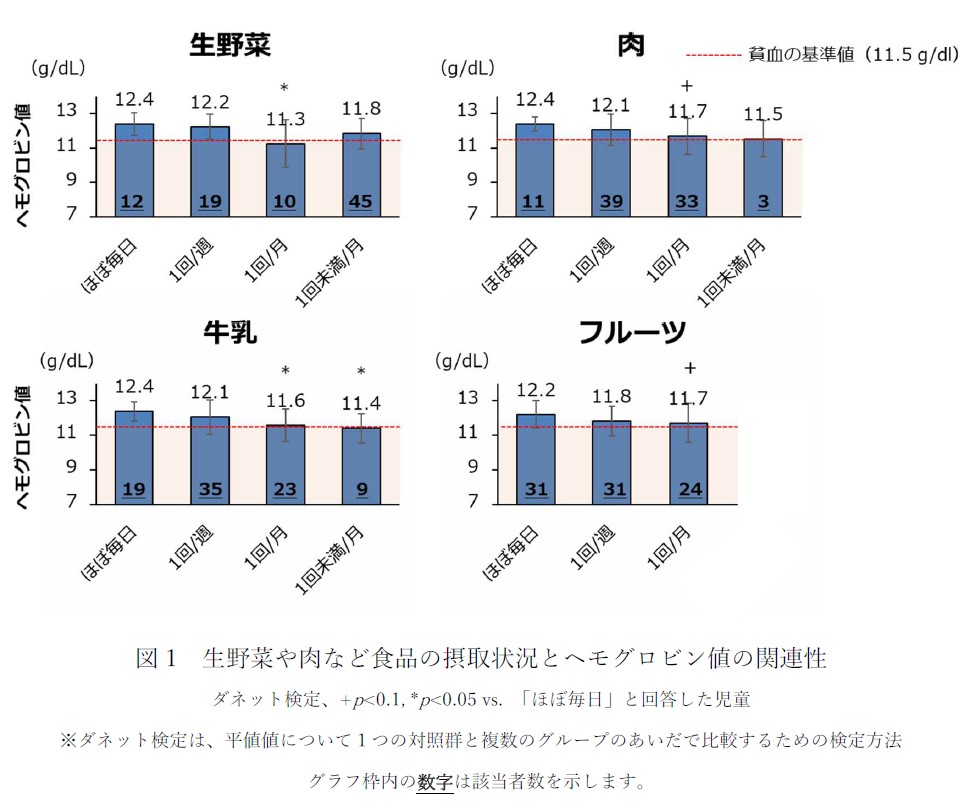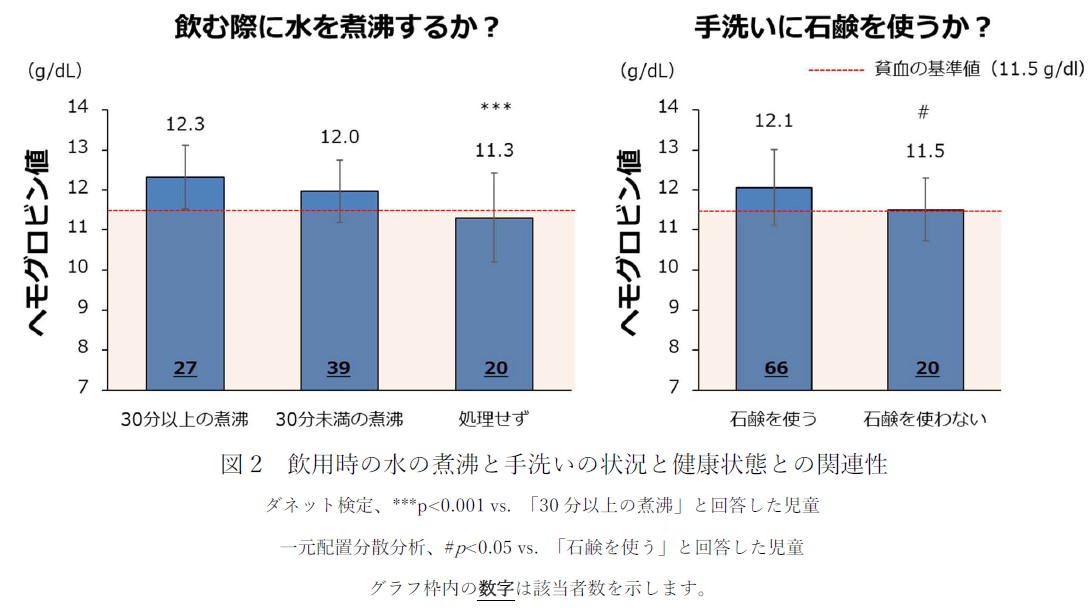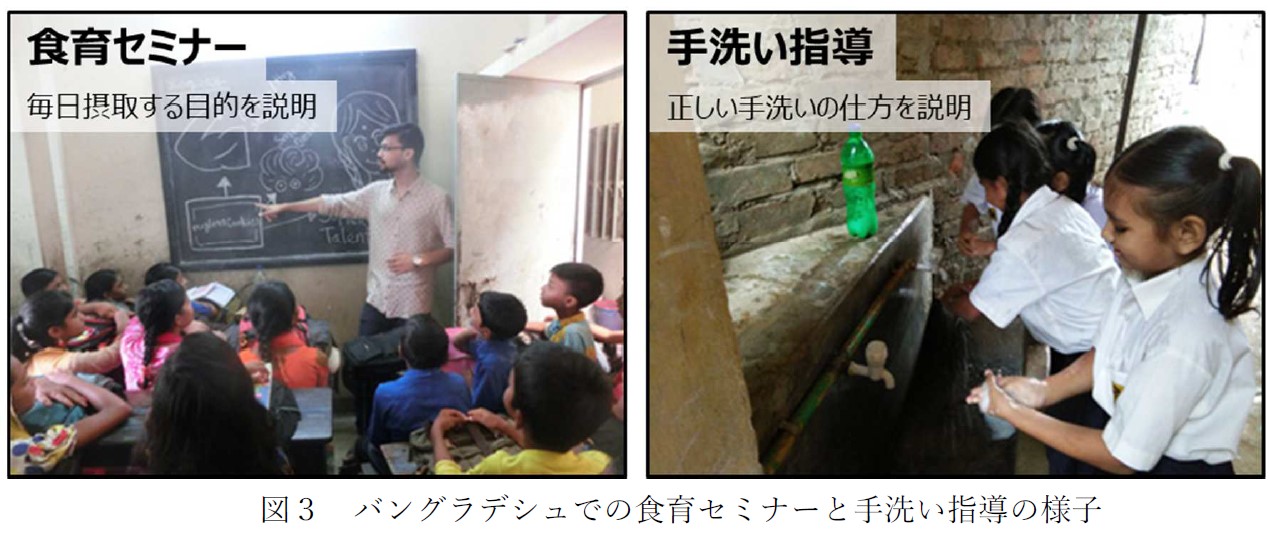Press Releases
* Please note that the news release contains the content at the time of the announcement and may differ from the latest information.
Of children in the People's Republic of Bangladesh
Report on the results of a survey on the relationship between health status, eating habits, and hygienic environment
The frequency of eating vegetables and meat, and the habit of boiling drinking water and using soap affect the health of children.
Euglena Co., Ltd.
Euglena Co., Ltd. (Headquarters: Minato-ku, Tokyo, President: Mitsuru Izumo) conducted a survey on the health status, eating habits and hygiene environment of elementary school students living in the slum area of Dhaka, the capital of the People's Republic of Bangladesh (hereinafter, "Bangladesh"). , We were able to confirm the effectiveness of the activities for improving health condition that we are implementing through the Euglena GENKI Program" (https://euglena.jp/genki/) from the research side.
So far, Euglena GENKI Program", we have distributed nutritious cookies containing Euglena children attending schools in the slums of Bangladesh. In order to solve this problem, we believe that it is essential not only to supplement nutrition but also to improve eating habits and hygienic environment, and we have carried out educational activities on eating habits and hygienic environment while grasping the actual situation in the area.
And this time, in Euglena GENKI Program" and educational activities, we conducted a survey on the relationship between health status and eating habits / hygiene environment. As a result of conducting a survey in an environment where hygiene is not always good, the frequency of intake of raw vegetables, meat, fruits, milk, etc. that leads to the maintenance of nutritional balance, and the boiling of drinking water that leads to the removal of bacteria, etc. We have reconfirmed that the hygienic environment, such as the use of soap, affects the health of children.
The results of this research were presented at the "79th Annual Meeting of the Japanese Society of Public Health" held from October 20 to 22, 2020, and received the poster award.
■ Purpose of research
Micronutrient deficiency, also known as "hidden hunger," is estimated to face as many as 2 billion people worldwide. In Bangladesh, one in three children under the age of five, about 5.5 million, is dysgenetic * 1, 33.1% of children aged 0 to 5 and 17.1 to 19.1% of children aged 6 to 10 have anemia. increase.
We started the "Euglena GENKI Program" in April 2014, and cookies containing Euglena (local name "Euglena Nutrition Biscuits") for Bangladeshi children in need of nutritional improvement. Is distributed as school lunch * 2. To date, we have been able to deliver a total of over 10 million cookies to children * 3.
And it's not just nutrition that affects your health. Especially in low-income households, because the water supply is not well maintained, it is possible that they are drinking unsanitary water as it is and that environmental factors such as inadequate hand-washing habits may be detrimental to their health. .. For example, poor hygiene can increase the risk of infection with bacteria and parasites, leading to chronic bleeding through inflammation and diarrhea, leading to the development of anemia.
Therefore, this time, at two elementary schools in Dhaka, the capital of Bangladesh, in order to confirm the usefulness of the "Euglena GENKI program" and educational activities on eating habits and sanitary environment, the relationship between health condition and eating habits / sanitary environment We conducted a survey on.
* 1 In the country, one in three children under the age of five, or about 5.5 million, are underdeveloped and tend to be deficient in vitamin A, iron, iodine, zinc, etc. (“WFP Bangladesh Country Brief (International)) From the United World Food Program) ”)
* 2 Released on March 28, 2019 https://www.euglena.jp/news/20190328-2/
* 3 Released on September 30, 2020https://www.euglena.jp/news/20200930-2/
■ Research content and results
In this study, we conducted a survey of children aged 7 to 9 years at two elementary schools in Dhaka, the capital of Bangladesh (L elementary school: 43, T elementary school: 43). In collaboration with Grameen Communications * 4, we conducted a blood test to understand the health condition at the target school of this study, and interviewed about the hygiene status of the living environment and eating habits. * 5.
* * 4 Grameen Communications is one of the Grameen organizations, and is developing information and communication services and IT education in rural areas in a complex manner.
* * 5 We fully explain the significance and purpose of the fluid test to the parents of the target children, and obtain the permission from the relevant authorities and the consent form from the parents.
(1) Children who frequently consumed raw vegetables, meat, milk, and fruits were in good health.
First, we interviewed children about their eating habits and investigated the frequency of intake of 16 items, which are the main food groups that are eaten daily in Bangladesh. Only 12 of the 86 children said they ate raw vegetables "almost every day", and only 19 of them ate "once a week", with the remaining 55 almost eating. I answered that there was no such thing (Fig. 1). When the relationship between the hemoglobin level * 6 used for diagnosing anemia and eating habits was investigated, the hemoglobin level was higher in children who ate raw vegetables "almost every day" than in children who answered "once a month". Was high, indicating good health. Similarly, it was suggested that children who eat meat, milk and fruits "almost every day" are in good health and less likely to develop anemia.
* * 6 Hemoglobin is a protein that carries oxygen in the blood. When the concentration of hemoglobin in the blood decreases, oxygen is insufficient and symptoms of anemia appear.

② Children who boil water and wash their hands with soap when drinking were in good health.
We investigated the hygienic environment, such as whether we have a habit of boiling water when drinking and whether we use soap when washing our hands (Fig. 2). Only 27 of the 86 children said they would boil water. Examination of the relationship between hemoglobin levels and the sanitary environment showed that children who said they had a habit of boiling water when drinking had higher hemoglobin levels than children who said they did not. It was. It was also shown that children who wash their hands with soap have higher hemoglobin levels than children who do not use soap. From these results, it is possible that boiling water when drinking and using soap to wash hands reduced the risk of infection with bacteria and parasites, and avoided bleeding through inflammation and diarrhea. It will be considered. Therefore, it was suggested that children who have a habit of boiling water when drinking and using soap to wash their hands are in good health and are less likely to develop anemia.

From this survey, in order to improve health in an environment where hygiene is not always good, daily nutrition from foods such as raw vegetables, meat, milk and fruits, and water when drinking I confirmed that it is important to boil the vegetables and wash them by hand with soap.
And, the interview survey by the questionnaire like this time is an effective means to know the health condition of the children, and it is included to continue the survey so that the living environment where the children live will be better. I hope it will help you solve your health problems.
The results of this survey reaffirmed the usefulness of our activities. Going forward, we will continue to aim to improve the nutritional status of Bangladeshi children while solving nutritional problems through the Euglena

<About "Euglena GENKI Program">
Euglena Euglena GENKI Program" in April 2014 with the aim of delivering nutrition to children around the world. Nutrition improvement as a school lunch in Bangladesh of the elementary school required Euglena to start the distribution of cookies, 66 schools, the children of about 1 million people, the average five days a week Euglena distributes cookies (2020 end of September). https://euglena.jp/genki/
<About Euglena Co., Ltd.>![[JPEG] Logotype (B) _mark (SG) _tagline](https://www.euglena.jp/wp_01/wp-content/uploads/2020/10/df6835983019f7eeaaf38aad5ce4dac8.jpg)
In 2005, we succeeded in establishing the world's first edible outdoor mass culture technology for the Euglena In Euglena and chlorella, we are also conducting research toward the production of biofuels. Euglena GENKI Program, which has been in operation since 2014 to deliver Euglena cookies with abundant nutrients to children in Bangladesh, will be expanded to all group products including cosmetics from April 2019. Listed on TSE Mothers in December 2012. TSE First Section market change in December 2014. We define "Sustainability First" as the Euglena Philosophy and develop our business. https://euglena.jp

-Contact for inquiries from the press-
Euglena Co., Ltd. Corporate Communication Division
